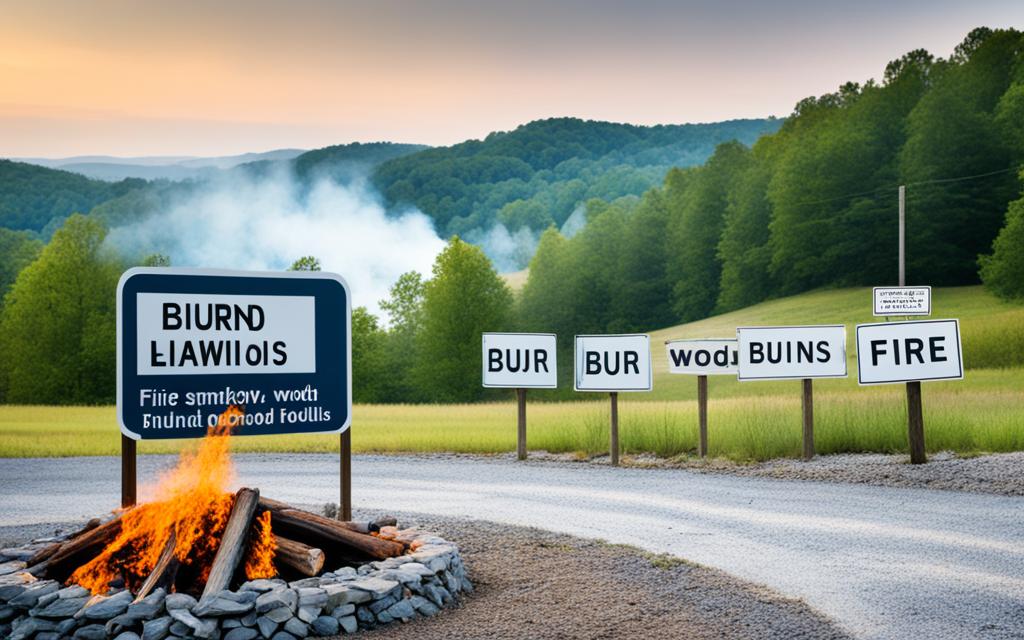Do you know about the burn restrictions in Virginia for 2024? Understand the penalties for not following the law. It’s crucial to get familiar with Virginia’s rules to avoid penalties.
Let’s look into the Burn Law in VA 2024. We’ll find out why it’s important, which activities are allowed, and tips for safe burning.
Why the 4 PM Burning Law Exists
The 4 PM Burning Law started in the 1940s to cut down on wildfires in Virginia during late winter and early spring. This law helps us understand how to lessen the risk of big fires. It’s very important for keeping our forests and homes safe.
Fires from burning debris are the top cause of wildfires here. Arson also adds to the risk. That’s why we need strong fire prevention steps.
This law puts limits on burning outside when danger is high. This timing matches when winds are higher, humidity is lower, and the ground is dry. By following these rules, we can greatly lower wildfire risks.
“The 4 PM Burning Law proactively minimizes wildfire risks. It stops outside burning when it’s most dangerous, protecting our lands and homes.” – John Smith, Fire Prevention Officer
Strong winds can make fires spread fast and out of control. That’s why the law restricts burning during these times. It also considers how dry the air and ground are. These rules help prevent fires from starting accidentally.
Knowing why the 4 PM Burning Law exists shows its value. By sticking to these rules, we help prevent wildfires. This keeps Virginia’s nature and communities safe.
Impact of the 4 PM Burning Law:
- Reduces the risk of wildfires during high-risk periods
- Protects Virginia’s forests and natural resources
- Prevents accidental fires from getting out of control
- Enhances community safety and reduces property damage
| Benefits of the 4 PM Burning Law | Implications of Non-Compliance |
|---|---|
|
|
Open-Air Burning Regulations
The 4 PM Burning Law in Virginia covers any outdoor fire not in a non-flammable container. It aims to reduce the risk of wildfires and protect the environment. Some special cases of fires are okay if they follow certain rules.
A fire within a rock ring or similar setup, covered by a small metal screen, might be allowed. This setup helps control the fire and keep it from spreading. Always be cautious and follow safety tips when having an open-air fire.
Some experts, known as certified prescribed burn managers, can get permits for special burning. They’re trained to burn safely. These permits recognize their skill in reducing the risk of wildfires.
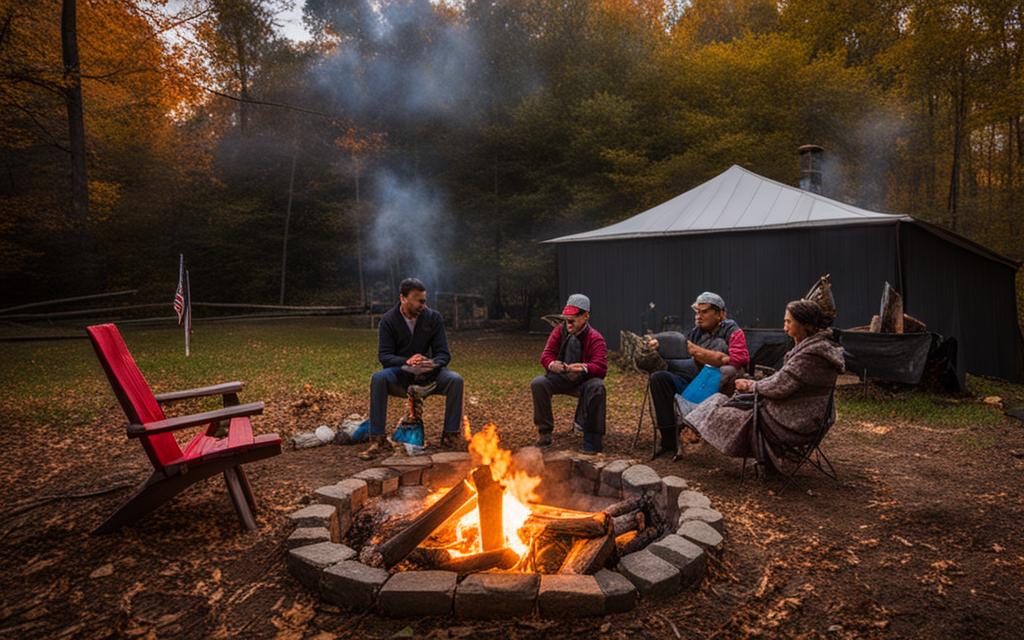
Knowing the rules about open-air burning is key. The Virginia Department of Forestry provides details on what’s allowed. They can also tell you about any permits you might need.
Following these rules helps you stay legal and supports fire prevention in Virginia. It’s a way to care for our environment and community.
Exemptions to the 4 PM Burning Law
The 4 PM Burning Law in Virginia allows some exceptions. It understands the needs of vineyard and orchard owners and those who love to barbecue. These exceptions let people do controlled burning for certain reasons. They help protect crops and keep the tradition of outdoor cooking alive.
Vineyard and Orchard Burning
Vineyards and orchards can be harmed by frost. This puts crops at risk. The law makes an exception for them.
Owners can start fires to keep their plants warm. This warmth fights off frost. It helps keep fruits and grapes safe and of high quality.
Barbecue Grills
The law doesn’t stop you from using charcoal or gas grills. So, you can enjoy outdoor barbecues freely. Grilled foods with their smoky taste can still be enjoyed. This is true whether you like charcoal or prefer gas grills.
But, using charcoal grills in parks or recreational areas is different. These are still under the law’s restrictions. This rule keeps public places safe from fire risks.
It’s important to know these exceptions to follow the law and stay safe. This way, vineyard and orchard owners can protect their crops. And barbecue lovers can keep enjoying their outdoor cooking.
| Activity | Status |
|---|---|
| Vineyard and Orchard Burning | Exempted |
| Charcoal or Gas-fired Barbecue Grills | Exempted |
| Open-air Charcoal Grills in Park Settings | Subject to the 4 PM Burning Law |
Fire Safety Tips for Burning in Virginia
When you burn outdoors in Virginia, following fire safety guidelines is key. This helps prevent fires from spreading and reduces accident risks. By being cautious, you protect lives, property, and nature.
- Check with local authorities: Always check with local authorities before you start an outdoor fire. They will tell you about any current burn bans or rules. This info is crucial for burning safely.
- Clear flammable materials: Make sure to clear flammable items like dry grass and brush away from your fire. Creating a safe zone around the fire stops it from spreading or starting accidentally.
- Have water and fire tools readily available: Keep water or a fire extinguisher close to douse the fire quickly if needed. Also, have tools like shovels to manage the fire better.
- Burn between 4:00 p.m. and midnight: Follow the 4 PM Burning Law and only burn during these hours. This helps avoid times when it’s windier and drier, which can cause fires to spread.
- Stay with the fire: Never leave your fire unwatched. Stay until it’s fully out and the ashes are cold. This way, you ensure the fire doesn’t spread or reignite.
“Fire safety is a duty we all share. By following these steps, we keep our communities safe from wildfires.” – Virginia Department of Forestry
Keep Debris Piles Small
Keep debris piles small when burning. Small piles are easier to manage and put out. This also keeps the fire from spreading unexpectedly.
Burn Barrels and Fire Safety
Make sure your burn barrel is in good shape and has proper ventilation. Check the barrel regularly for damage. Also, place it on a fireproof surface, far from buildings, and away from anything flammable.
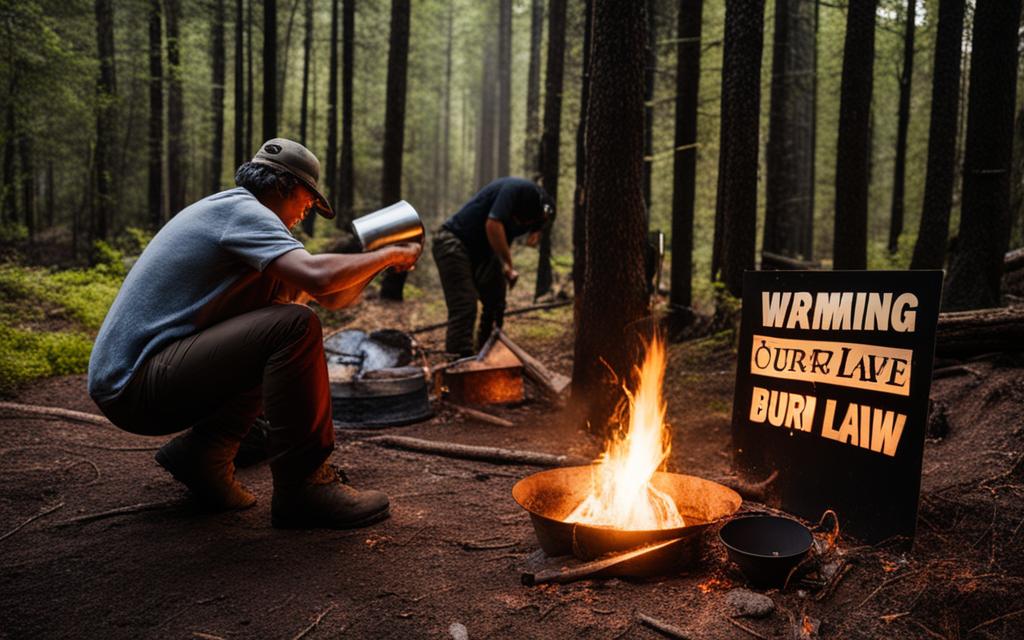
| Fire Safety Tips for Burning in Virginia | Key Takeaways |
|---|---|
| Check with local authorities for burning restrictions | Stay informed about any specific regulations or burn bans |
| Clear flammable materials from the fire area | Prevent the spread of fires and accidental ignition |
| Have water and fire tools readily available | Ensure quick response and effective fire management |
| Burn between 4:00 p.m. and midnight | Comply with the 4 PM Burning Law to minimize fire risks |
| Stay with the fire until it is completely out | Reduce the risk of fire spread or reignition |
Burn Law Resources and Information
The Virginia Department of Forestry is a key source for understanding Virginia’s Burn Law. They offer many resources and publications. These are aimed at teaching people about outdoor fire laws and encouraging safe burning.
The Outdoor Fire Laws brochure is one important guide. It explains the 4 PM Burning Law, exceptions, and tips for safe outdoor burning. It’s essential for those who want to follow Virginia’s burn laws.
The Virginia Department of Forestry’s website is also packed with info on safe burning. You can find guidelines, answers to common questions, and more. It helps ensure you have the latest information.
If you need more help or have questions about the Burn Law, contact local fire departments or the Virginia Department of Forestry. Their team can offer advice and support regarding outdoor fire laws and regulations.
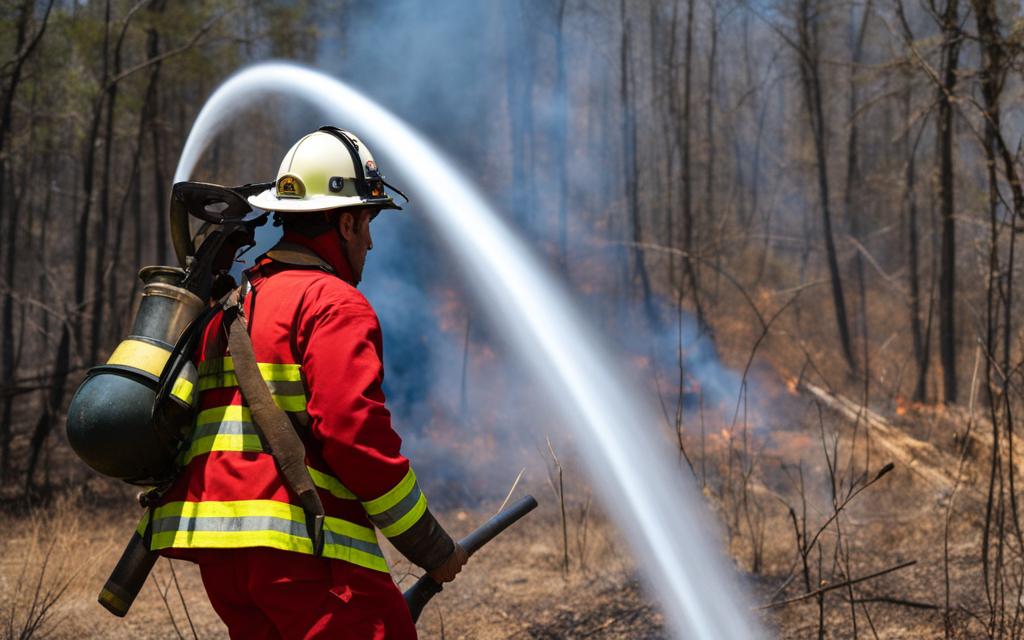
Using these resources and getting help from these organizations will keep you informed. This way, you can enjoy outdoor burning safely and follow the Burn Law.
Local Burning Ordinances and Restrictions
Virginia has a 4 PM Burning Law, but local rules may add more limits. It’s key to know your area’s specific regulations to avoid fines. Check with local officials to find out what applies.
Finding out about local burning rules is critical. You may need permits or to inform local fire departments. Doing this ensures you follow the right steps and respect any area-specific bans.
Local officials keep you posted on burn bans or temporary rules. Such updates are due to weather or other conditions. Staying informed is crucial to avoid starting accidental fires and keeping everyone safe.
Understanding local burning laws lets you burn open fires without risks. Always put fire safety first. And, follow all rules to protect our environment and the community.
Alternatives to Burning Yard Debris
Burning yard debris is common but can lead to wildfires. Thankfully, there are safe and eco-friendly ways to manage yard waste. Here are some alternatives to burning:
1. Chipping:
Turning yard trimmings into mulch or compost through chipping is effective. You can use a wood chipper or get a professional service. This creates nutrient-rich mulch, improving soil health and preventing weeds. Add chipped material to compost piles to help them break down faster.
2. Composting:
Composting is a great way to avoid burning debris. Create a compost pile or use a bin to turn waste like grass clippings and leaves into great compost for gardens. It reduces waste and makes the soil richer, helping plants grow better.
3. Building Brush Piles:
Rather than burning brush, stack it to make wildlife homes. Brush piles create shelters for birds, mammals, and bugs. They attract creatures that keep pests away and support a healthy ecosystem. Make sure to build piles safely away from buildings and keep them tidy to avoid fires.
Choosing these alternatives helps cut down excess vegetation safely, lowers fire risks, and helps the environment. Pick the method that fits you, and always follow local rules when chipping, composting, or making brush piles.
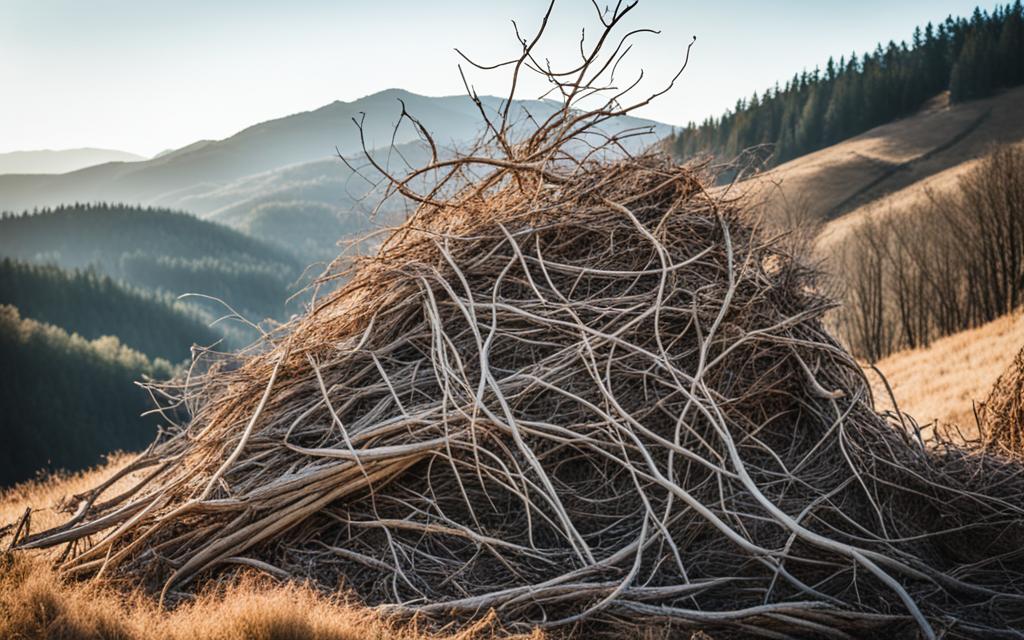
Safety Precautions for Small Equipment
Fire safety with small equipment like lawn mowers and chainsaws is vital. These tools can spark and ignite dry materials, creating wildfires. Following safety guidelines is key to reduce these dangers.
Don’t use small equipment on dry or windy days. Dry conditions and winds can spread fires quickly. Make sure flammable materials like leaves and grass are not around.
Keep small equipment well-maintained. Sharp blades and clean machines prevent overheating. Always stick to the manufacturer’s advice for use and care.
Fire Safety Tips for Lawn Mowers:
- Inspect and clean the mower before each use to remove any debris that can generate sparks.
- Mow during the cooler hours of the day to minimize the risk of heat-caused fires.
- Keep a fire extinguisher or water source nearby in case of emergency.
Fire Safety Tips for Chainsaws:
- Regularly check the chain tension and sharpen the chain to prevent excessive heat and sparks.
- Avoid cutting near flammable materials and ensure a clear workspace.
- Keep a fire extinguisher or water source nearby in case of emergency.
Following safety steps can lower the risk of fires from lawn mowers, chainsaws, and other equipment. It’s important to always be careful and alert with equipment that can create sparks.
Preventing fires with small equipment is critical. Be prepared, follow maintenance rules, and use equipment wisely. This protects you and your surroundings from fires.
For fire safety guidelines, check the Virginia Department of Forestry site or contact your local fire department.
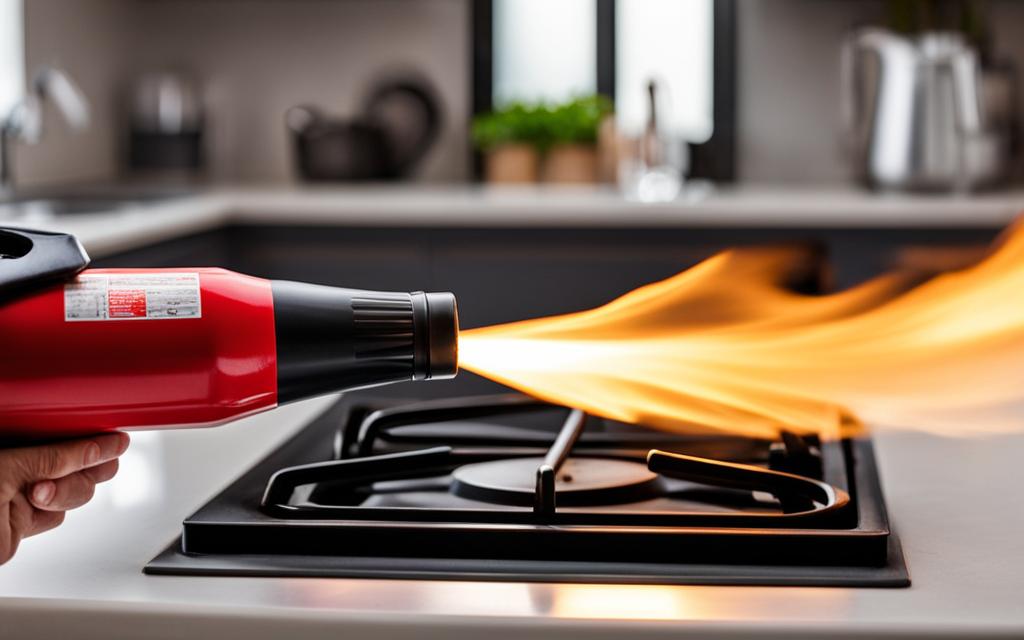
**Table:** Fire Safety Precautions for Small Equipment
| Equipment | Safety Precautions |
|————–|—————————————————————————————————-|
| Lawn Mowers | – Inspect and clean before use
– Mow during cooler hours
– Keep a fire extinguisher nearby |
| Chainsaws | – Monitor chain tension and sharpness
– Avoid cutting near flammable materials
– Stay prepared with a fire extinguisher |
**End of Section 9**
Conclusion
Knowing about Virginia’s Burn Law is key for locals to follow rules and keep fires safe. The 4 PM Burning Law, active from February 15 to April 30, limits open-air fires. It also lists some exceptions.
To help stop wildfires and guard the environment, residents should stick to fire safety advice. They should also check with local officials and look for other options instead of burning. For more details or queries on burn laws, reach out to the Virginia Department of Forestry or your local authorities.

